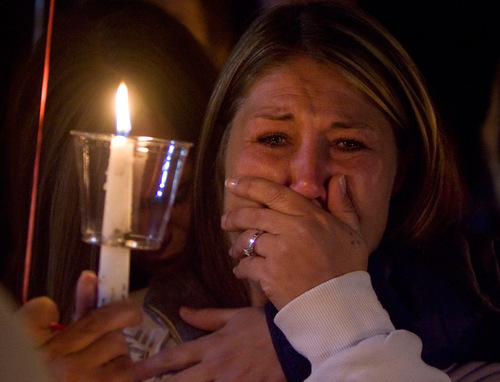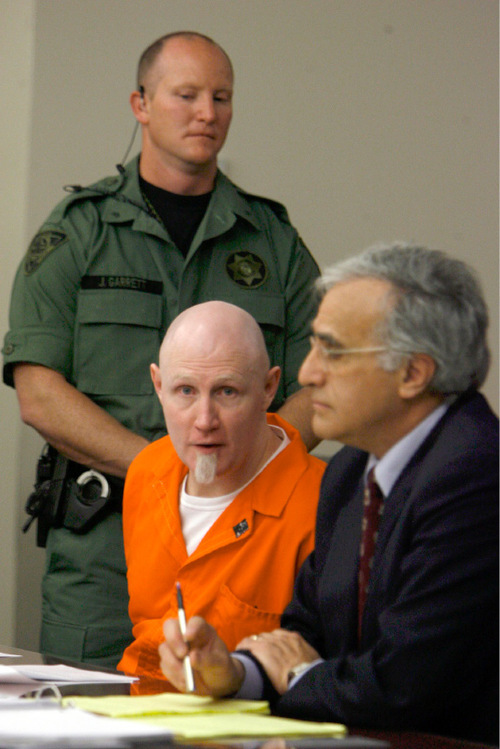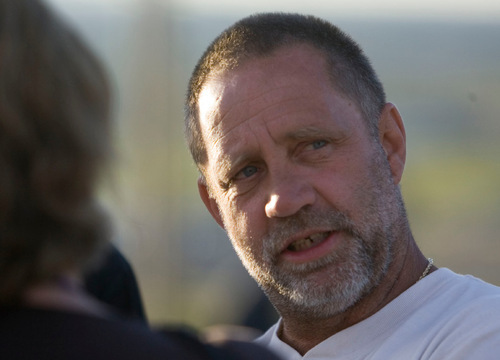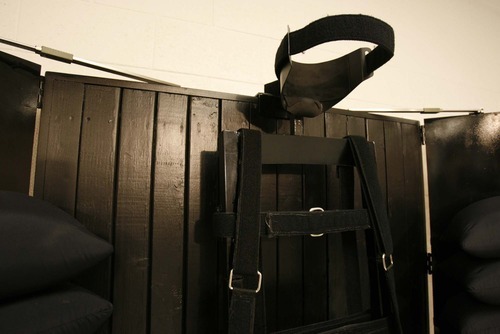This is an archived article that was published on sltrib.com in 2011, and information in the article may be outdated. It is provided only for personal research purposes and may not be reprinted.
It's not your average family reunion.
The family of executed killer Ronnie Lee Gardner plans to gather Saturday — the first anniversary of his death — on land in Box Elder County that they hope will one day be a farm for troubled youths. And to raise money for the farm, the reunion is doubling as a fundraiser that family members have dubbed "Ronstock."
The 30 to 40 relatives expected to attend can buy a commemorative "Ronstock 2011" T-shirt for $15.
"To us, he was more than just a murderer," said Gardner's brother Randy, who organized the event.
Randy Gardner has spent the past year mourning his brother and trying to help fulfill what Ronnie Gardner pitched as a reason he should be spared from the firing squad — the first, and possibly the last, to be used in the United States since Utah executed another inmate by that method 14 years earlier.
Randy Gardner says he has raised a few thousand dollars for the Back to Basics Farm & Organic Ranch. The project is already registered as a nonprofit corporation in Utah, and Gardner said an attorney is helping him complete paperwork so it has nonprofit status with the Internal Revenue Service and can begin fundraising in earnest.
Ronnie Gardner developed an interest in organic gardening after reading a book about it in prison. Under a plan the two Gardner brothers devised, children with legal and substance-abuse problems would work at the farm as part of their rehabilitation.
The 160-acre parcel north of the Great Salt Lake is undeveloped. Randy Gardner said the land still needs to be surveyed and a well needs to be dug.
The farm is "probably going to be a five- to 10-year project," Gardner said.
In his final weeks, Ronnie Gardner presented the farm as a reason the courts and the Utah Board of Pardons and Parole should keep him alive. Gardner thought he could raise money and promote the farm from prison.
In 1984, Gardner murdered Melvyn Otterstrom in a Salt Lake City bar. While he was awaiting trial for that case in 1985, a female acquaintance met him at the Metropolitan Hall of Justice and handed him a revolver.
Gardner, with his hands shackled at his waist, turned and began firing. He killed attorney Michael Burdell and shot bailiff Nick Kirk in the stomach, leaving him in pain for the rest of his life. Burdell's survivors favored commuting Gardner's death sentence, but the families of Otterstrom and Kirk pushed for execution.
Craig Watson, a Sandy police lieutenant who was a friend of Melvyn Otterstrom, has no objection to the farm.
"If they're doing something that can help somebody, more power to them," Watson said.
Watson said knowing Gardner is gone and the court appeals have stopped has made the past year peaceful for the Otterstrom family and their friends.
"They say time heals, and I don't know that it heals, but it helps," Watson said.
The year has been tougher for Gardner's family, who, last year, made public appeals to spare him from the death chamber. The Facebook page they started for Gardner includes mournful messages from his siblings, nieces, nephews and children. Gardner's daughter has tried twice to commit suicide since her father's death, Randy Gardner said.
At the weekend gathering, Gardner also plans to dispose of his brother's ashes. The family hasn't decided if they will be spread or buried on the farm, he said.
Later this month, Gardner is going to Washington, D.C., to participate in an anti-death-penalty vigil.
"It's kicked me in the butt," Gardner said of his brother's execution.
"Made me want to do something."
Twitter: @natecarlisle —
Utah's death row
Utah still has nine men on its death row. That includes one inmate, Douglas Anderson Lovell, whom the Utah Supreme Court has said may withdraw his guilty plea. Due to pending appeals, none are likely to be executed in the near future, said Assistant Attorney General Tom Brunker.









